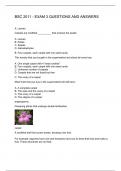Exam (elaborations)
BSC 2011 - EXAM 3 QUESTIONS AND ANSWERS
- Course
- Institution
A. Leaves Carpels are modified __________ that enclose the seeds: A. Leaves B. Petals C. Sepals D. Gametophytes B. Four carpels, each carpel with one seed cavity This tomato that you bought in the supermarket and sliced at home has: A. One single carpel with 4 "seed cavities" B. Four c...
[Show more]



